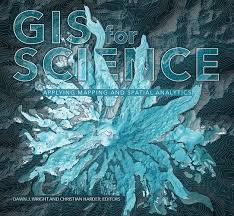GIS for Science: Applying Mapping and Spatial Analytics

GIS for Science. Applying Mapping and Spatial Analytics details the work of real-world scientists using geographic information systems (GIS) to expand our understanding of the world. GIS provides a framework for applying science to almost every human endeavor as we aspire to transform the world through mapping and analytics.
The book is composed of the following chapters. Click on the name to access to the resources linked on each chapter.
- Global Ecosystem Mapping (Roger Sayre, US Geological Survey)
- What Lies Beneath (Daniel Coe, Washington Geological Survey)
- The Anatomy of Supervolcanoes (Melanie Brandmeier, Esri Germany)
- Predicting Global Seagrass Habitats (Orhun Aydin and Kevin A. Butler, Esri)
- Extreme Heat Events in a Changing Climate (Olga Wilhelmi and Jennifer Boehnert, NCAR)
- Finding a Way Home (Lauren Griffin and Este Geraghty, Esri)
- Restoring Coastal Marine Habitats (Zach Ferdana, et. al, The Nature Conservancy, Tom Brouwer, FloodTags; and Omar Abou-Samra, American Red Cross)
- Modeling Bird Responses to Climate Change (Gary Langham, Molly Bennet, with Brooke Bateman, et al., National Audubon Society.
- Mapping Ancient Landscapes (Jason Ur and Jeffrey Blossom, Harvard University)
- Identifying the Natural Efficient Frontier (Jeff Allenby, Chesapeake Conservancy; and Lucas Joppa and Nebojsa Jojic, Microsoft Research)
- A Glacier in Retreat (Jacki Klancher, Todd Guenther, and Darran Wells, Central Wyoming College)
- Panamapping: GIS for Conservation Science (Dan Klooster, et al., University of Redlands; Experience Mamoni; and Fundacion Geoversity.
- Technology Showcase (Esri Staff)
Due to shared copyright and agreement within the authors, we share a PDF of Chapter 7: Restoring Coastal Marine Habitats written in collaboration with the Global Disaster Preparedness Center, The Nature Conservancy, and Flood Tags of the work implemented in Grenada and Indonesia.
For more information, access to the online companion of the book.
